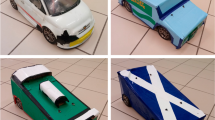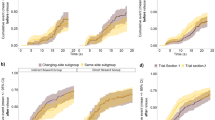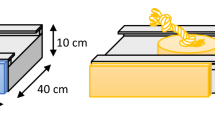Abstract
Dogs are able to flexibly adjust their social behaviour to situation-specific characteristics of their human partner’s behaviour in problem situations. However, dogs do not necessarily detect the specific role played by the human in a particular situation: they may form expectations about their partners’ behaviour based on previous experiences with them. Utilising inanimate objects (UMO—unidentified moving object) as interacting agents offers new possibilities for investigating social behaviour, because in this way we can remove or control the influence of previous experience with the partner. The aim of the present study was to investigate whether dogs are able to recognise the different roles of two UMOs and are able to adjust their communicative behaviour towards them. In the learning phase of the experiment, dogs were presented with a two-way food-retrieval problem in which two UMOs, which differed in their physical appearance and abilities, helped the dog obtain a piece of food in their own particular manner. After a short experience with both UMOs, dogs in the test phase faced one of the problems in the presence of both inanimate agents. Overall, dogs displayed similar levels of gazing behaviour towards the UMOs, but in the first test they looked, approached and touched the relevant partner first. This rapid adjustment of social behaviour towards UMOs suggests that dogs may generalise their experiences with humans to unfamiliar agents and are able to select the appropriate partner when facing a problem situation.




Similar content being viewed by others
References
Abdai J, Gergely A, Petró E, Topál J, Miklósi Á (2015) An investigation on social representations: inanimate agent can mislead dogs (Canis familiaris) in a food choice task. PLoS One 10(8):e0134575. doi:10.1371/journal.pone.0134575
Agnetta B, Hare B, Tomasello M (2000) Cues to food location that domestic dogs (Canis familiaris) of different ages do and do not use. Anim Cogn 3:107–112. doi:10.1007/s100710000070
Brauer J, Bos M, Call J, Tomasello M (2012) Domestic dogs (Canis familiaris) coordinate their actions in a problem-solving task. Anim Cogn 16:273–285. doi:10.1007/s10071-012-0571-1
Gaunet F (2008) How do guide dogs of blind owners and pet dogs of sighted owners (Canis familiaris) ask their owners for food? Anim Cogn 11:475–483. doi:10.1007/s10071-008-0138-3
Gaunet F (2010) How do guide dogs and pet dogs (Canis familiaris) ask their owners for their toy and for playing? Anim Cogn 2:311–323. doi:10.1007/s10071-009-0279-z
Gaunet F, Deputte BL (2011) Functionally referential and intentional communication in domestic dogs: effects of spatial and social context. Anim Cogn 14(6):849–860. doi:10.1007/s10071-011-0418-1
Gaunet F, El Massioui F (2014) Marked referential communicative behaviours, but no differentiation of the “knowledge state” of humans in untrained pet dogs versus 1-years-old infants. Anim Cogn 17:1137–1147. doi:10.1007/s10071-014-0746-z
Gergely A, Petró E, Topál J, Miklósi Á (2013) What are you or who are you? The emergence of social interaction between dog and an Unidentified Moving Object (UMO). PLoS ONE 8:e72727. doi:10.1371/journal.pone.0072727
Gergely A, Abdai J, Petró E, Kosztolányi A, Topál J, Miklósi Á (2015) Dogs rapidly develop socially competent behaviour while interacting with a contingently responding self-propelled object. Anim Behav 108:137–144. doi:10.1016/j.anbehav.2015.07.024
Horn L, Zs Virányi, Miklósi Á, Huber L, Range F (2012) Domestic dogs (Canis familiaris) flexibly adjust their human-directed behaviour to the actions of their human partners in a problem. Anim Cogn 15:57–71. doi:10.1007/s10071-011-0432-3
Jenkins HM, Barrera FJ, Ireland C, Woodside B (1978) Signal centred action patterns of dogs in appetitive classical conditioning. Learn Motiv 9:272–296. doi:10.1016/0023-9690(78)90010-3
Kaminski J, Neumann M, Brauer J, Call J, Tomasello M (2011) Dogs (Canis familiaris) communicate with humans to request but not to inform. Anim Behav 82:651–658. doi:10.1016/j.anbehav.2011.06.015
Krause J, Winfield AFT, Deneubourg JL (2011) Interactive robots in experimental biology. Trends Evol 26:369–375. doi: 10.1016/j.tree.2011.03.015
Kubinyi E, Miklósi Á, Kaplan F, Gácsi M, Topál J, Csányi V (2004) Social behaviour of dogs encountering AIBO, an animal-like robot in a neutral and in a feeding situation. Behav Proc 65:231–239. doi:10.1016/j.beproc.2003.10.003
Ladu F, Bartolini T, Panitz SG, Chiarotti F, Butail S, Macri S, Porfiri M (2015) Live predators, robots, and computer-animated images elicit differential avoidance responses in zebrafish. Zebrafish 12:205–214. doi:10.1089/zeb.2014.1041
Lakatos G, Soproni K, Dóka A, Miklósi Á (2009) A comparative approach to dogs’ (Canis familiaris) and human infants’ comprehension of various forms of pointing gestures. Anim Cogn 12:621–631. doi:10.1007/s10071-009-0221-4
Melis AP, Hare B, Tomasello M (2006) Chimpanzees recruit the best collaborators. Science 311:1297–1300. doi:10.1126/science.1123007
Miklósi A, Polgárdi R, Topál J, Csányi V (2000) Intentional behaviour in dog–human communication: an experimental analysis of “showing” behaviour in the dog. Anim Cogn 3:159–166. doi:10.1007/s100710000072
Milgram NW, Head E, Weiner E, Thomas E (1994) Cognitive functions and aging in the dog: acquisition of nonspatial visual tasks. Behav Neurosci 08:57–68. doi:10.1037/0735-7044.108.1.57
Müller Ac, Riemer S, Range F, Huber L (2014) Dogs’ use the solidity principle-revisited. Anim Cogn 3:821–825. doi:10.1007/s10071-013-0709-9
Range F, Möslinger H, Zs Virányi (2011) Domestication has not affected the understanding of mean-end connection in dogs. Anim Cogn 15(4):597–607. doi:10.1007/s10071-012-0488-8
Riedel J, Buttelmann D, Call J, Tomasello M (2006) Domestic dogs (Canis familiaris) use a physical marker to locate hidden food. Anim Cogn 9:27–35. doi:10.1007/s10071-005-0256-0
Spinello C, Macri S, Porfiri M (2013) Acute ethanol administration affects zebrafish preference for a biologically-inspired robot. Alcohol 47(5):391–398. doi:10.1016/j.alcohol.2013.04.003
Topál J, Kubinyi E, Gácsi M, Miklósi Á (2005) Obeying social rules a comparative study on dogs and humans. J Cult Evol Psychol 3(3–4):223–243. doi:10.1556/JCEP.3.2005.3-4.1
Virányi ZS, Topál J, Miklósi Á, Csányi V (2006) A nonverbal test of knowledge attribution: a comparative study on dogs and children. Anim Cogn 9:13–26. doi:10.1007/s10071-005-0257-z
Acknowledgments
This research was supported by the Swiss National Science Foundation (SNSF) Sinergia project SWARMIX (Project Number CRSI22 133059) and MTA-ELTE Comparative Ethology Research Group (MTA 01 031) and OTKA K 112138. The authors are grateful to the owners for participating in the experiment.
Author information
Authors and Affiliations
Corresponding author
Rights and permissions
About this article
Cite this article
Petró, E., Abdai, J., Gergely, A. et al. Dogs (Canis familiaris) adjust their social behaviour to the differential role of inanimate interactive agents. Anim Cogn 19, 367–374 (2016). https://doi.org/10.1007/s10071-015-0939-0
Received:
Revised:
Accepted:
Published:
Issue Date:
DOI: https://doi.org/10.1007/s10071-015-0939-0




